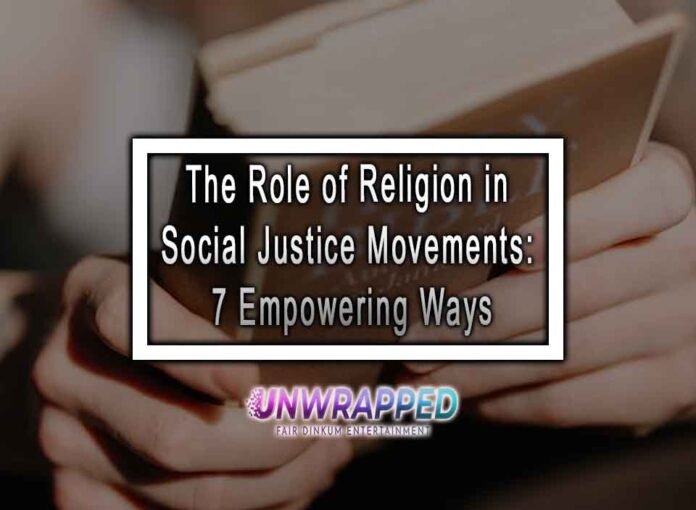Unveiling the Unbreakable Bond: How Religion Fuels Social Justice Movements
In an ever-changing world, social justice movements have emerged as powerful agents of change, striving to eradicate inequality and foster a more equitable society. While these movements have diverse roots, one common thread unites them: the influence of religion. Whether it’s Christianity, Islam, Buddhism, or other faiths, religion has played a significant role in inspiring and guiding the pursuit of justice. Join us on this enlightening journey as we explore seven compelling ways religion empowers and uplifts social justice movements, breaking barriers and fostering a more inclusive world.
1. Moral Compass and Ethical Framework
Religion serves as a moral compass, providing a strong ethical foundation for social justice movements. Sacred texts and teachings often emphasize compassion, fairness, and equality, inspiring activists to stand up for marginalized communities and fight against oppression. By aligning their actions with these guiding principles, social justice advocates are driven by a deeper sense of purpose and righteousness.
2. Building Empathy and Solidarity
Faith-based communities encourage their followers to cultivate empathy and compassion towards all beings. Through religious practices such as prayer, meditation, and communal worship, individuals develop a greater understanding of the struggles faced by others. This empathy fosters a sense of solidarity, empowering social justice movements to bridge gaps and form powerful coalitions across diverse backgrounds.
3. Challenging Injustice within Religious Institutions
While religion can be a source of inspiration, it is not immune to perpetuating injustice. However, within religious communities, advocates are rising to challenge discriminatory practices and beliefs. Through internal advocacy and reform, these activists push religious institutions to align with the core values of compassion, justice, and inclusivity, thereby contributing to broader social change.
4. Advocating for the Marginalized
Religious teachings often underscore the importance of caring for the vulnerable and marginalized in society. Many social justice movements inspired by religion focus on addressing issues like poverty, discrimination, and human rights abuses, championing the rights and dignity of those who have been silenced or overlooked.
5. Nonviolent Resistance and Forgiveness
Several social justice movements rooted in religion embrace the principles of nonviolent resistance and forgiveness. Inspired by the examples of historical figures like Mahatma Gandhi and Martin Luther King Jr., activists employ nonviolent tactics to challenge oppressive systems and promote lasting change without resorting to violence.
6. Spreading Awareness and Education
Religious institutions often serve as hubs of education and awareness. Faith-based activists leverage their congregations and networks to educate the masses about social justice issues, inspiring more people to take action and support the cause. This amplification of knowledge is vital for driving societal transformation.
7. Providing Humanitarian Aid and Support
In times of crisis, religious organizations frequently play a crucial role in providing humanitarian aid and support to affected communities. Whether it’s responding to natural disasters or addressing social emergencies, religiously motivated social justice movements step up to alleviate suffering and rebuild lives.
United by Faith, Ignited by Justice: The Unyielding Power of Religion in Social Change
The interplay between religion and social justice movements is a testament to the transformative potential of faith in creating a more just and inclusive world. From offering a moral compass and fostering empathy to challenging injustice within religious institutions, religion empowers advocates to address inequality head-on. By advocating for the marginalized, promoting nonviolent resistance, spreading awareness, and providing humanitarian aid, these movements forge a powerful bond that transcends boundaries and fosters positive change. As we continue to witness the unyielding power of religion in fueling social justice movements, let us stand together, united by faith and ignited by the pursuit of justice.
Discover more: Eastern vs. Western Religious Philosophies











